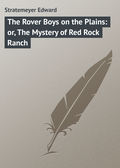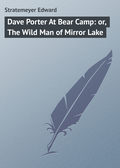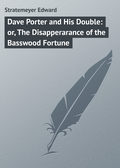
Stratemeyer Edward
Marching on Niagara: or, The Soldier Boys of the Old Frontier
CHAPTER XXIII
UP THE MOHAWK VALLEY
"Henry! Sam! Schnitzer! Wake up! The camp is surrounded by Indians!"
Dave uttered the cry loudly, and on the instant Barringford leaped to his feet, reaching for his ever-ready gun as he did so. The Dutch trapper was also awake in short order, and Henry followed.
"Injuns?" queried Barringford. "Whar?"
"In those bushes, and behind yonder trees. What shall we do?"
Before the old frontiersman could answer that question, a voice came out of the darkness:
"Are the white men English?"
"Yes, we're English," answered Barringford.
"Then the redmen are glad to meet their brothers. The redmen were afraid the sleeping ones were French."
"Who are you?" asked Henry.
"Arrow Head, of the Miamis. We have joined the great English warrior Johnson, to fight the French. Let us be friends."
A few words more followed, and Barringford told the Indians to come forward. At this eight redmen advanced to the camp-fire, on which the boys threw some extra brushwood, so that they might see the new arrivals. The Indians had slung their weapons over their shoulders, as a sign of peace, and our friends did likewise.
Schnitzer had met Arrow Head before, and said he would vouch for it that the warrior was all right. From the under chief it was learned that General Johnson, with seven hundred Indians, had already marched to meet General Prideaux and that the camp of the army was some forty miles distant, up the river. Arrow Head had been left behind to "drum up" a few stragglers, but was now ready to go forward with the redmen under him.
"The war talk at Canajoharie castle was a great one," said the under warrior. "Your General Johnson has treated us like brothers, and we will fight for him to the bitter end. We have sung our war songs and put on our war paints, and no French soldiers shall stand up against us. Henceforth the English shall be our brothers for evermore."
"Yah, now you vos talkin' common sense," put in Schnitzer. "Ven you fight mid dem Frenchers you vos all fools – for dem Frenchers vill pe licked chust so sure as Henry Hudson discovered New York. I peen a Dutch prophet, und I know," and he said this so earnestly that Arrow Head was duly impressed. Schnitzer, who afterward made himself famous as a pioneer in Ohio, could do a few sleight of hand tricks, and because of these tricks many of the redmen considered him something of a wizard.
All rested until daybreak and then, after a hasty breakfast, in which the Indians joined the whites, the march forward was resumed. Soon it began to rain, but the drops did not come down heavily, and Barringford said the storm had shifted to the westward. In this he was right for by noon the sun was shining as brightly as ever.
As they trudged along, Dave and Henry questioned Arrow Head concerning the French Indians and their captives, and about Jean Bevoir. They could, however, get little satisfaction, excepting that Arrow Head had heard that all the captives had been removed to the shores of Lake Erie and Lake Ontario, and that a general movement toward Montreal and Quebec was contemplated.
While our friends were trudging through the woods northward, General Prideaux had gone to Schenectady. He had with him his own division of the army consisting of two regiments of English soldiers and twenty-six hundred Americans, principally from New York, although with the New Yorkers were a good sprinkling of rangers from Vermont, Massachusetts, New Jersey, Pennsylvania and Virginia, men who roamed from one colony to another, looking for a chance to better themselves and ever ready for a fight, be it with the French or the Indians.
From Schenectady General Prideaux moved up the Mohawk Valley, which was the most direct route to the lakes. This old Indian trail was protected by Fort Herkimer, Fort William, Fort Stanwix, Fort Bull, and other fortifications along the river and Lake Oneida. But this great wilderness was a wilderness still, with stopping places few and far between, and had it not been for the friendliness of the Indians – thanks to the good work done by General Johnson – matters might have gone badly with the English. More than once there was an alarm and at night sentries were posted with as much care as though they were in the very heart of the enemy's country.
It was not until three days after meeting Arrow Head and his followers that our friends came in sight of General Prideaux's command, toiling painfully around some of the rapids in the river. This first sight of the army was a thrilling one, for uniforms and weapons shone brightly in the clear sunlight. Dave's heart gave a bound.
"Puts me in mind of the time I marched with Braddock," he said to Henry. "Indeed, it might almost be the same scene over again."
"Well, let us hope it isn't the same defeat over again," returned his cousin, grimly.
The army came to a halt half an hour later, and then they learned that General Johnson and his Indians were miles away. They talked the matter over and at length concluded to move forward with the soldiers, trusting to luck to interview Johnson later.
It was an easy matter for Barringford and Hans Schnitzer to locate a number of friends among the rangers, and they received a hearty welcome, and Dave and Henry were put at their ease. One old soldier asked Dave if he had seen much of the war, and when the lad told him he had been both with Braddock and with Forbes in the attacks on what was now Fort Pitt the old soldier shook his hand warmly and "reckoned as how" he'd "do fust-rate to fight them Frenchmen at Fort Niagara."
Our four friends were assigned to a company under Captain John Mollett, who was known to Barringford, and inside of a couple of days felt thoroughly at home.
In those days the Mohawk River was navigable with canoes and batteaux to within four miles of Lake Oneida. From this point the boats had to be carried across the watershed, on the backs of horses, Indians, and soldiers to the lake. From Lake Oneida it was clear sailing down the Oswego River to Lake Ontario.
As they had done so many times in the past, some of the English soldiers were apt to sneer at the provincials, and this led to more than one wordy quarrel and not infrequently to blows.
"They make me sick!" declared Henry, one day, after listening to the bluster of several grenadiers. "To hear them talk one would think only they were able to fight. I reckon we can do our full share."
"If they say anything to me I'll tell 'em what happened under Braddock," returned Dave. "And they can take it as they please."
Barringford counseled moderation, but secretly he was as much put out as the boys even though some of the English were his warm friends. He had come near to having a quarrel with an English lieutenant named Naster and he was still much disturbed over this.
That very night Dave, while on picket duty, heard Lieutenant Naster finding fault with an old ranger named Campwell. Campwell was a pioneer over sixty-five years of age, and while a good shot and a good fighter was at times not just right in his mind, although he could by no means be called crazy. The pair came close to where Dave was on guard and the young soldier heard the lieutenant poke all manner of fun at the old man.
"Better go home and mind the babies, Campwell," said the English lieutenant. "It's more in your line of duty, isn't it now?"
"Let me alone!" cried the old man. "If I was to mind babies I'd not mind such a one as you, I'll warrant. 'T would have been better had you remained in England."
"Ha! so you call me a baby?" roared Lieutenant Naster, sourly. "If I am, how do you like that from me?" And he gave the old pioneer a shove that sent him headlong over the roots of a nearby tree.
The action was so cowardly, and so entirely uncalled for, that it made Dave's temper rise on the instant, and regardless of consequences he leaped to where Lieutenant Naster was standing and caught him by the shoulder.
"Leave him alone, you brute!" he ejaculated. "How dare you treat an old man like that?"
In sudden fear the English lieutenant wheeled around. When he saw it was only a boy who had spoken, and a hated provincial at that, his rage returned.
"What do you mean by placing your dirty hand on me!" he roared. "I'll have you arrested on the spot! This to me – an officer of the King's Guard! Preposterous!"
"It wasn't right to molest old Campwell," returned Dave, sturdily. "He is as brave as any of us, and I have heard tell that he has fought well all through this war. You ought – "
"Don't tell me what I ought to do, you dirty little plantation hand! Say another word and I'll report you at headquarters."
"As you please," answered Dave, recklessly. "But if you worry Campwell any more you'll have an account to settle with Colonel Haldimand – and I can tell you that he won't put up with it any more than any of us."
At the mention of the officer in charge of the provincials the English lieutenant was for the moment nonplussed. He knew Colonel Haldimand to be a Swiss-American of stern military bearing and one to whom many of the pioneers were warmly attached.
"You – you threaten me?" he asked, after an ugly pause.
"You can take it as you please."
"My affair with this old man was my own – not yours."
"Yes, but I'm glad he took my part," came from Campwell, as he arose slowly to his feet, for the fall had deprived him of his breath. "You took a mean advantage o' me. I've a good mind to fill ye full o' buckshot!" And he caught hold of his gun threateningly.
It was now that Lieutenant Naster showed his true nature. Much of his color forsook him and he retreated in alarm.
"Don't – don't!" he cried, hurriedly. "I – I didn't mean to be – ah – serious. The whole thing was meant in fun."
"No fun in shoving me down."
"I – ah – I didn't mean to shove you so hard – upon my honor I did not, Campwell. Let us drop it; won't you?"
The old pioneer gave a grunt. He was too open-hearted to understand such a mean, sneaking nature as that of the Englishman.
"We'll drop it – but keep your hands off of me in the future," he said, at last.
"I won't bother you. But you – " The lieutenant turned to Dave. "I'll bear you in mind, my fine young cock-of-the-walk, – and I'll take you down a peg or two ere I'm done with you, remember what I say!" And with a shake of his fist he hurried away in the darkness.
A minute after this Barringford came up, asking what was the matter. When told his brow contracted.
"That lieutenant is a regular sneak," he said. "Keep your eye open fer him, Dave – an' don't trust him a farthing's worth. He is just the kind to play you dirty the first chance he gits."
CHAPTER XXIV
HENRY IS ATTACKED
The days to follow were full of hard work for the young soldiers. They were detailed with the baggage corps, and had all they could do to bring through the many things left in their care. Although Dave did not know the truth, it was Lieutenant Naster who had much of this work piled on the young soldier's shoulders.
The sail down Lake Oneida proved a period of rest, for which both Dave and Henry were truly thankful. Both made the journey in a long and wide batteau, commonly called to-day a flat-bottom boat. It was now the end of June and the weather was hot. On one occasion the youths went in bathing, but this time nothing molested them. They also went fishing and brought out as nice a mess of fish as the clear waters of this lake afforded.
"It's an ideal spot for a home," said Dave. "Puts me in mind of the Kinotah."
"If the Kinotah is as good as this I wouldn't want anything better," replied Henry.
The batteau, of extra-large size, was filled with baggage, and besides the boys there were ten rangers on board, including old Campwell. The old man sat in the rear of the craft, eyeing the shore critically.
"My eyesight ain't none o' the best," he drawled, presently. "But onless I'm in error, I jest see a number o' Injuns behind yonder skirt o' bushes."
All looked in the direction, and presently one of the other rangers said that he, too, saw at least two Indians. They appeared to be following up the boats and at the same time did all they could to keep hidden.
"What do you make of that?" asked Henry of Barringford, who was pulling an oar beside him.
The old frontiersman shrugged his shoulders. "Depends on whether they are friends or enemies, Henry," he said. "If they are friends more'n likely they'll jine us when we reach the river."
"And if not?"
"Then they ought to be captured, for if they ain't friends they are spying for the French."
Evidently the Indians had not been discovered by those on the other batteaux, and after a short talk the man in charge of that containing our friends decided to report the case to his superior, in a boat some distance ahead. Pulling with all strength, the clumsy craft was, in quarter of an hour, brought alongside of Captain Mollett's boat.
"Indians, eh?" said the captain, reflectively. "Couldn't make them out very well, could you?"
"No, captain."
"Hum! We'll have to investigate this."
Word was passed to several other batteaux, and soon after a boat turned toward shore, having on board fifteen rangers, including Barringford and Henry. Dave and Schnitzer wished to accompany the others but this was not permitted.
"Good-by until we meet again!" cried Henry, on leaving.
"Take good care of yourself," returned Dave, and so with a wave of the hand the two cousins parted.
It did not take the batteau long to reach the north shore of the lake, and as soon as the craft grounded all leaped out. Fastening the boat to a nearby tree, the rangers set out on a search for the Indians.
The party was under the command of George Harvey, well known as an old Indian fighter of the Mohawk valley and a man who was as shrewd as he was daring. He had brought the rangers ashore boldly, but once in the shelter of the timber he halted his men to give them advice.
"We'll spread out in a straight line, due north," he said. "Each man about thirty yards from the next. Then we can beat up the timber thoroughly. Don't fire until you're sure of what you are doing, for to kill a friendly Indian just now would be the worst thing we could do. General Johnson would never forgive you for it. He had hard enough work to make 'em come over to us."
It fell to Henry's lot to skirt the shore of the lake, with Barringford next to him. The way was easy where the trail ran close to the water, but at other points was exceedingly difficult, for big stones and thick brushwood frequently blocked his progress.
"Phew! but this is no child's play!" he muttered to himself, as he came out on a point of the shore where the sun blazed down fiercely. "A fellow couldn't feel any hotter plowing corn or turning hay. I'd rather go swimming than hunt up Indians, I must confess."
His soliloquy was broken by the flitting of something from one tree to another, some distance ahead. The movement was so rapid, and the distance so great, that he could not settle in his mind what the object had been.
"Was that an Indian, or some big wild bird?" he asked himself. Drawing back into the shelter of some bushes he held his gun ready for use, and gazed ahead with much interest.
The sun was now well down in the west, so his shadow fell in front of him as he gazed eastward. Of a sudden another shadow loomed up beside his own. He turned, but before he could defend himself, he was hauled back and his gun was wrenched from his grasp. He tried to cry out, but a red hand was instantly clapped over his mouth.
Henry tried his best to free himself but it was useless. Two brawny warriors had attacked him, and now one of the redmen flourished a long hunting knife in his face, at the same time muttering some words of warning in a guttural tone. Henry did not understand the language spoken, but he knew what was meant – that he would be killed if he attempted to either fight or cry out – and so for the time being he lay still.
At a distance the young soldier heard the sounds of footsteps, and he rightfully surmised that Barringford was continuing his journey forward, with the rest of the rangers. Soon the sounds died away and all became as silent as the grave.
But the Indians did not wish to take any chances and so the one with the knife continued to stand over the young soldier until his companion was certain the whites had gone on. Then he emitted a short and peculiar bird-like whistle.
In less than two minutes fully a dozen warriors appeared on the scene, crawling from behind logs and rocks and from holes among the tree roots. All came forward and gazed curiously at the prisoner.
A parley lasting but a few minutes followed. Henry tried his best to make out what was said, but this Indian dialect was entirely new to him. He half suspected that these redmen had come down into New York from the north shore of Lake Ontario and in this he was not mistaken. They were spies, as it was long afterward proved, sent out by Saint Luc de la Corne, the French officer in command at Isle Royal, afterward called Chimney Island.
The coming ashore of the English had evidently disconcerted the Indians and they hesitated over what should be their next move. But at last they set off on a rapid march northward, taking Henry with them. The young soldier's hands were bound behind him and he was given to understand that if he did not move along as suited them he would be killed on the spot.
"A nice pickle I'm in and no mistake," he mused, as the party toiled up a long hill and through a dense patch of timber where the undergrowth almost barred all progress. "These redskins won't give me the slightest chance to get away, and where they are taking me is more than I can guess. Wonder what Barringford will say when he finds I am missing?"
Some time after this a distant shot sounded out, at which all of the Indians came to a halt. The shot was followed by several others, all coming from the direction of the lake.
"Perhaps they are signals meant for me," thought Henry. "Oh, if only Barringford and the others strike the right trail!"
The shots having come to an end, the forward march was resumed, and the party did not halt again until long after nightfall. Henry was bound to a tree and one of the Indians, who seemed less bloodthirsty than the others, gave him a bit of meat, some corn cakes, and a drink of water. The young soldier thanked the redskin and tried to engage him in conversation, but the Indian merely shook his head and walked away.
When the Indians retired for the night Henry was tied to a short stake driven deeply into the ground. This allowed him to rest on one side or the other, but still kept his hands behind him – a most uncomfortable position. But lying down, even like that, was better than standing against the tree, and he was so tired he was soon fast asleep.
A kick in the ribs awoke him at early daybreak, and after a light breakfast, the Indians resumed their journey. In a short time they gained a small stream, and from a hiding place brought forth several canoes. Henry was made to enter one of the canoes and the whole party began to paddle down the stream swiftly and in the utmost silence.
The watercourse was less than five yards wide and in many places the branches of the trees on the opposite banks intertwined, forming a long, low bower, beneath which the sunlight was hardly able to penetrate. Outside it was hot and dry, but on this stream it was deliciously cool, and under other circumstances Henry would have enjoyed the canoe trip greatly. Game was plentiful and frequently popped up within easy shooting distance. The Indians did not use their guns, however, although a number of birds and a deer were brought down by the aid of a bow and arrows in the hands of an Indian in the front canoe.
Before the trip on the river came to an end Henry calculated that they had covered at least sixteen miles. They went ashore just above a small water-fall and now the Indians took their canoes with them. The party turned westward, and Henry guessed that they were bound for the eastern shore of Lake Ontario.
"If they once get me on the lake I'll be booked for Canada, that's certain," he mused, dismally. "If only I had half a chance I'd run for it, even though I'd risk being shot."







